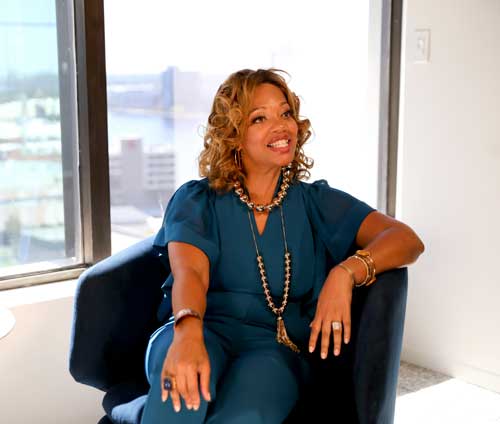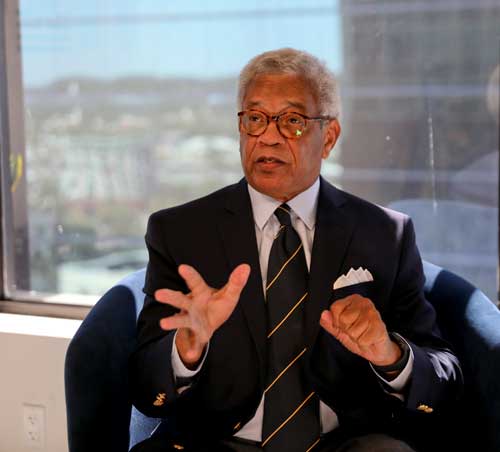Getting ahead, giving back
Hampton Roads business leaders talk success, social responsibility
Getting ahead, giving back
Hampton Roads business leaders talk success, social responsibility
Brought to you by Virginia Business and Bank of America, join us every other month for the Diversity Leadership Series — virtual fireside chats with a diverse group of Virginia business leaders sharing their insights and thoughts on leadership, their career paths and diversity and equity.
The second installment in our series took place Sept. 30 in Hampton Roads, with a discussion between Angela Reddix, founder, president and CEO of Norfolk-based health care management and IT consulting firm ARDX, and Jack L. Ezzell Jr., founder and CEO of Hampton-based government contracting firm Zel Technologies LLC, also known as ZelTech.
Both Ezzell and Reddix are inductees of Old Dominion University’s Strome Entrepreneurial Center Hall of Fame.
What follows is an excerpt from their conversation. To watch the entire program, visit VirginiaBusiness.com.
Jack Ezzell: I’ll tell you a story: One of the things that I encountered in the early ’60s when I first went into the military, [if] you were Black, going into certain neighborhoods, the assumption was that if a person of color was moving into this neighborhood, it’s going to deteriorate, the property values are going to go down. I said to myself, “I’m going to mow my lawn twice a week.” I’ve always done that. I say to everyone, if you do more, and that’s the standard, that is really what you have to do. That’s one of [my] guiding principles. … What about your story? Has race been a big issue in what you’ve done?
Angela Reddix: It’s so interesting hearing you speak about mowing your lawn twice. That is literally and figuratively what I believe many of us are raised to [do]. We have to be that much better.
One of our core values … is individuality. I pride myself on having a diverse population. Even as a Black employer, I feel that it is so important for me to have all perspectives at the table. I’m smarter, I’m better because of it. And with that, I recognize that I’m an African American woman and so I absolutely feel that I have to come there and then some, to overcompensate.

[But] I have to tell you, something happened in the last couple of years, Jack, where I don’t walk with that same thought any longer. I feel that my gifts — Scripture speaks to this — my gifts will make room for me. I have sown enough that I have decided … that my experience, what I have sown in the community, what I have sown in this world, the education, all of that, that’s going to have to speak now.
Now, my motivation is I want to inspire those who have not seen someone who looks like this do it. It’s less about proving myself to everyone else and more about inspiring someone to say, “OK, I can do it.” What inspiration comes from is showing your flaws.
Ezzell: That’s wonderful. I share those same views. I’m really the same way like that. I’m very, very proud of the organization we have, the company we have. It’s diverse [by] all means, but there’s something else, though, that I think is very important for us as business owners: That’s the whole issue of giving back.
I am so fortunate. I’ve been blessed and I just really want to give it back. I’m fortunate, again, that I have an organization where I’m allowed to do a lot of that. I’ve been able to spend almost half of my time being involved in things. I do a lot with individuals with disabilities, higher education, that kind of thing. I know you do the same. I say to business owners when they come in, the fundamental role of a business is to make a profit. What one chooses to do with that profit is a different story.
I challenge everyone — it’s not always about money; give of your time and your values. … That has been … the part of my company that’s made me so very complete.
Reddix: Corporate social responsibility. Absolutely. To whom much is given, much is required. That is something that I live and breathe. Jack, I see you in the community in that way. I also know that you can’t give what you don’t have. … I say the two most valuable assets we have … [are] your time and … relationships. Because with time, you can make money. With no time, you can’t make any money. With relationships, doors can open, or doors can be closed to you. Being able to nurture those, being able to really think about how you’re going to budget your time and budget your relationships and being strategic about that is something that’s important to me.
I say that to say, many people have a heart to give, but you really have to do the work to create stability for yourself so that you can give to others. … From the very first year, [ARDX has] been doing programs where we’re investing in the community and, yes, through time, those have scaled because we’ve had more access. With more access, we can give more time and more money.
That is absolutely the place I’m in right now. Maslow’s hierarchy of needs: You have to take care of your food, your safety, your shelter, before you can get to self-actualization. I am thankful because I will say I’m living the dream right now, where I can invest the majority of my time, the majority of my mind and my heart into building up others.

Ezzell: Yes. There’s another thing … my wife will … probably beat me up when I tell [this] story but my family has been important in my life. I’d like to tell the story about shortly after I became a CEO. I was going back [to] this small town in North Carolina with my wife, and we were going through, and we passed by a service station. My wife looks over at the service station [and] she says, “Oh, I know that guy. I think he might have been one of my boyfriends.” …. I said, “Hahaha, if you had married him instead of me, you would be the wife of a service station attendant.” She looked at me and said, “If I had married him instead of you, you would be pumping gas and he would be a CEO.”
You talked to me before about how proud you are of your kids and your family, I too … [am] blessed with [my] family but [also with] the family I have in my company. … Those are just the things that really matter.
Reddix: Yes, love is everything — Tina Turner, “What’s Love Got to Do with It?” When you’re talking about leadership … you’re not supposed to have relationships. [Human resources], you’re supposed to be stiff, and that doesn’t work today. People bring their whole selves to the office.
If you can’t have compassion and love and understand that that is someone’s child, that’s someone’s wife, husband, and their spirit matters, and how you build them up or you tear them down, it matters. It’s not just affecting the team in the office, but they take this stuff home and you’re impacting a household. In this world today, mental health is such an important thing for us to consider as leaders and most leaders aren’t trained to even understand mental state of mind.
Ezzell: What tips would you give to those … who are starting businesses and are concerned about what are the keys to success? What are some of the tips that you’d give to business owners?
Reddix: It’s the African proverb that says, “If you want to go fast, go alone. If you want to go far, go together.” I will say tip No. 1 is, you don’t have to do it alone. In order to not do it alone, you really need to understand where you’re trying to go. You have to be very clear with your vision because you attract those people in your life who can support that vision.
No. 1 is to ensure that you build relationships [so] you don’t have to do it alone. No. 2 is, it’s not about getting there fast. … You have to build it to last and doing that, that means one step at a time, but … build it with the end in mind. I think the third thing — which probably is the first thing — is really, you can’t give what you don’t have, so you have to take care of self: mind, body, spirit. You have to have a foundation of that.
There’s a lot of bling out there sparkling. Everyone seems to be moving so fast, social media, you can see everything or what you think you see, which may or may not be real, but you really have to almost have blinders to be clear with what you’re called to do. And when you’re walking according to your purpose, somehow things just align.
i












